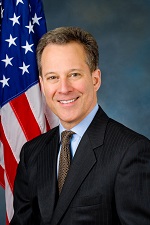Two months after Daiichi Sankyo disclosed a $39 million False Claims Act settlement with U.S. officials, the details of the civil suit against the Japan-based drugmaker were laid out by the New York attorney general's office.
Daiichi Sankyo disclosed in mid-January that it had reached a civil settlement with the U.S. Justice Department, 49 states and the District of Columbia, saying only that it involved speaker programs for its blood pressure drugs Azor (olmesartan/amlodipine), Benicar (olmesartan), Benicar HCT (plus hydrochlorothiazide), and Tribenzor (plus medozomil); and the cholesterol treatment Welchol (colesevelam).
 |
| New York Attorney General Eric Schneiderman |
New York Attorney General Eric Schneiderman, in a poorly written and error-prone news release, laid out the case against Daiichi Sankyo, adding that the financial settlement of $39 million included $10 million to 49 state Medicaid programs and $19 million to other federal programs involved in the case. A whistleblower was to receive $6.1 million from the settlement, which covers all states but Arizona. The remaining $3.9 million was not explained.
But the release offered details about the allegations against the drugmaker. According to Schneiderman's office, the states and federal government claimed that Daiichi Sankyo paid kickbacks to physicians in the form of speaking fees, lavish dinners and other expenses.
Some kickbacks were paid, the AG's office said, even if a doctor spoke only to his staff about the drug. Sometimes several doctors were paid for the same event, according to the statement, and some doctors collected honoraria even if an event had been canceled.
Daiichi Sankyo's internal rules limited spending on meals for doctors to $140 per person, but some of the dinners exceeded even that amount, the AG said.
In addition to the financial penalties, Daiichi Sankyo is required to set up internal compliance systems over the next 5 years as part of a corporate integrity agreement with the U.S. Department of Health and Human Services.
In response to the AG's announcement, Daiichi Sankyo repeated the same statement it gave in January, that it was pleased to have settled the case.
- here's the NY AG release
- and the Daiichi Sankyo January release